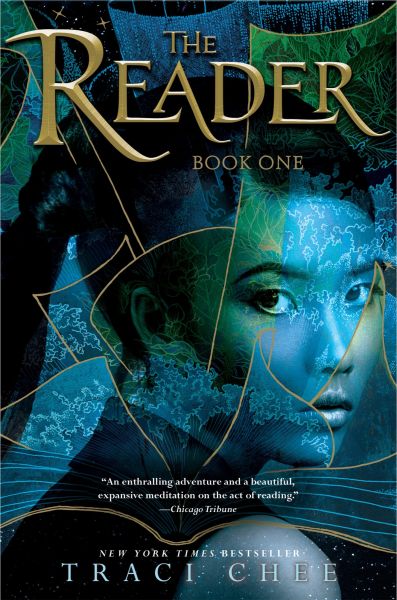The Book of Life
The Reader (Sea of Ink and Gold, volume 1)
By Traci Chee

12 Jul, 2019
Traci Chee’s 2016 The Reader is the first volume in her Sea of Ink and Gold series.
Sefia and her aunt Nin have been on the run ever since Sefia’s father was brutally murdered. Now, thanks to Sefia’s failed attempt at stealing a bandana, what had been a safe refuge is a refuge no longer. Someone may have recognized Nin and that means the pair have to flee. On their trail: killers seeking to recover a precious item stolen by Sefia’s parents.
The precious treasure is a book, whatever a book might be.
Nin is captured but Sefia remains free. She sets out to rescue her aunt. Even though her aunt may be dead. Even though the quest could take years, if it succeeds.
Sefia thinks she might have succeeded when she frees a prisoner concealed within a large, portable box. But the prisoner is not Nin, but an odd, speechless boy covered in scars. Sefia had heard that impressors, lackies of a man named Serakeen, were kidnapping children. “Archer”, as Sefia names the silent boy, was one such victim.
Impressors track them and try to recapture their prize. Archer turns out to be a skilful warrior (trained by the impressors, poor kid). Sefia is a also talented fighter; they win free.
But Sefia is no closer to finding Nin. Oh well. She does not really need to seek her enemies. They need the Book. Given time, they will come to Sefia.
~oOo~
The black hats have grand goals: an end to warring states, an all encompassing empire with no external enemies, an empire guided by an enlightened few. This might be a Heroic and laudable goal. However, the means by which her antagonists go about their goal suggests that the author is not entirely on board with Team One-kingdom-under-the-sky.
Most of the cultures in this book are illiterate1; they have no concept of the written word. At the same time, they have technology sufficient to make revolvers2 and sustain complex cultures. This strikes me as odd. In our world, most states of any size were forced to develop some non-memory means of managing taxes and trade. Even before writing, there were clay tokens in Mesopotamia and quipus in the Andes. There is magic in this world and perhaps it is used to keep track of things, but if so, how far can that be developed before it counts as a form of writing? Feel free to argue heatedly in comments.
This is a Young Adult book. But it features a level of brutality surprising even in a modern YA. Captured children are turned into killing machines. Sefia’s enemies kill and torture with abandon; they take a Beria-esque glee in offing prisoners in front of their loved ones. Archer’s massacres are reminiscent of child-weapon X‑23’s rampages in the movie Logan (which post-dates The Reader); Logan got an R rating whereas this is aimed at teen readers. Granted, violence was only part of that R rating and I bet a lot of kids snuck into the theatre to watch Logan.
The book does offer moral clarity, a usual feature of YAs. The antagonists may think that their ends justify any and all means, but they are such nasty sorts that we know that they are bad and their ends are foul. They’re so nasty that I do not think that there will be any point in this series at which some of the thugs will have an “Are we the baddies?” moment.
If only because the last pair who did have that epiphany were hunted down and brutally killed.
This book leaves too much in suspense to be considered a standalone. However, it does start off the series with a lot of energy and a surprising quantity of blood. So much blood.
The Reader is available here (Amazon), here (Amazon.ca) and here (Chapters-Indigo).
1: I thought I’d caught the author out when one of her characters mentioned being able to read someone but the character in question is one of the few who are literate.
2: This is not the sort of secondary universe where magic only applies to old-fashioned technology, like swords. People have ways of enchanting modern technology. There’s a pistol that will kill any time it is drawn from its holster. That sounds great until the text points out that the pistol-owner can clean the pistol only after having killed someone and before re-holstering the pistol.
“Anything can be magical” applies to books as well.
